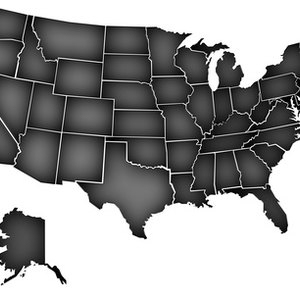
Most states in the United States levy some form of state income tax on top of the federal income tax. Seven states, however, have no form of individual income tax, and two other states tax only certain forms of income. Even when considering property and sales taxes, most of these states rank as having the lowest tax burdens in the country altogether.
Alaska
The Alaska Legislature repealed the state's income tax in 1980, a few years after the completion of the Trans-Alaska Pipeline. Oil taxes and property taxes on the local level provide most of the state's revenue. As such, the state consistently has had the lowest tax burden in the nation, according to the Tax Foundation. With the fluctuation of oil prices, however, the Legislature has considered reinstating a state income tax, including in 2002, when Alaska's House of Representatives approved a bill for an income tax.
Florida
Florida levies no income taxes on individuals and instead relies on sales and use tax, intangible tax and corporate income taxes for revenues. From 1977 to 2008, the other taxes average out to about 7.4 percent of the average Floridian's income, according to the Tax Foundation. This makes Florida the state with the fourth lowest tax burden in the nation.
Nevada
Neither individuals nor corporations pay a state income tax in Nevada. Even though Nevada's sales tax is above the national median and the state levies state property taxes in addition to local property taxes, the Tax Foundation still ranks the state as having the second-lowest tax burden in the United States.
South Dakota
South Dakota does not have income taxes for either corporations or individuals, though bank franchises do pay taxes in the state. It also has a lower-than-average sales tax and collects property taxes on the local level only. As a result, the Tax Foundation ranks South Dakota as the fifth-lowest tax burden in the nation and the best climate for business taxes.
Texas
Of the more than $77 billion that Texas collected in taxes and fees during the 2008-2009 fiscal year, none came from personal income tax. Texas does not levy a corporate income tax either, though the state does have a gross receipts tax for businesses. Its sales and property taxes are relatively high compared to the rest of the nation, however, making it the eighth-lowest individual tax burden in the nation, according to the Tax Foundation.
Washington
Washington has not had an income tax since 1933 and also does not levy a corporate income tax, though, like Texas, the state does have a gross receipts tax. In November 2010, however, Washington voters are considering a ballot initiative for individuals making more than $200,000 per year. Washington also collects higher-than-average sales and property taxes, making the state's tax burden the 16th lowest in the nation, according to the Tax Foundation.
Wyoming
Wyoming residents pay no state income taxes, and the state also levies no corporate income tax nor taxes on bank accounts, capital gains or retirement income from out of state. As of 2010, the state reports no legislative plan to implement such taxes. Even though its property taxes are among the nation's highest, it has the third-lowest tax burden in the United States, according to the Tax Foundation.
Other
Two states, Tennessee and New Hampshire, do not tax wages, but both states levy a flat tax on income from dividends and interest. Both states also have corporate income taxes, according to the Tax Foundation.
References
Resources
Writer Bio
Michael Baker has worked as a full-time journalist since 2002 and currently serves as editor for several travel-industry trade publications in New York. He previously was a business reporter for "The Press of Atlantic City" in New Jersey and "The [Brazoria County] Facts" in Freeport, Texas. Baker holds a Master of Science in journalism from Quinnipiac University in Hamden, Conn.

